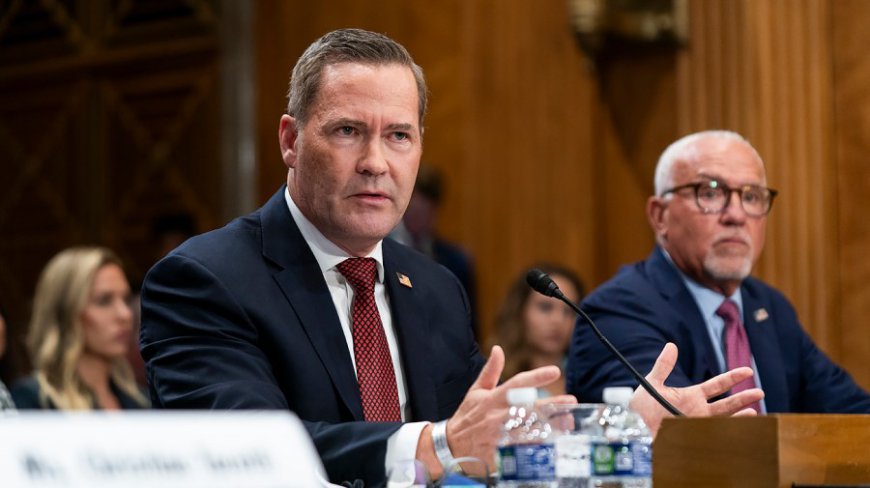Trump's UN nominee faces scrutiny over Signal chat but emerges largely unscathed
President Trump’s former national security adviser, Mike Waltz, emerged Tuesday from a Senate confirmation hearing largely unscathed over his role in mistakenly adding a journalist to a group chat discussing sensitive military attack plans against the Houthis in Yemen. While some Democrats on the Senate Foreign Relations Committee promised a “brutal” hearing for Waltz’s nomination...

President Trump’s former national security adviser, Mike Waltz, emerged Tuesday from a Senate confirmation hearing largely unscathed over his role in mistakenly adding a journalist to a group chat discussing sensitive military attack plans against the Houthis in Yemen.
While some Democrats on the Senate Foreign Relations Committee promised a “brutal” hearing for Waltz’s nomination as ambassador for the United Nations, his confirmation is nearly guaranteed in the Republican-controlled Senate, and lawmakers generally focused their questions on substance rather than scrutiny.
Sen. Cory Booker (D-N.J.) delivered one of the most scathing rebukes of Waltz and appeared to get under his skin. Booker criticized Waltz, a former Army colonel, Green Beret and three-term Republican congressman from Florida as showing “profound cowardice.”
“At a moment where our national security was clearly compromised, you denied, you deflected, and then you demeaned and degraded those people who objectively told the truth and criticized your actions,” Booker said.
Waltz pushed back, referring to his time in the military.
“I appreciate the men and women that I've had to lead in combat, and I think the last thing they would call me is a coward,” he said.
Trump removed Waltz from his position as national security adviser in May in the wake of scrutiny and criticism over the sloppy handling of the Signal chat. The role was taken over by Secretary of State Marco Rubio. But Trump retained Waltz as an adviser, keeping in place his nearly $200,000 salary and nominating him for the United Nations post.
The move served a number of functions. It offered Waltz a small rebuke for the fallout from the Signal chat but kept him at a senior-level position with the administration. The U.N. ambassador is traditionally a Cabinet position.
Waltz replaced Rep. Elise Stefanik (R-N.Y), who was originally nominated as ambassador, but whom Trump decided to keep in the House to protect the GOP’s slim majority.
Republicans lined up behind Waltz, calling him “one of the most well qualified U.S. ambassador nominees to the United Nations ever” and describing him as a man of “integrity, grit and principle.”
Democratic fury over "Signalgate" is centered on Secretary of Defense Pete Hegseth for publishing the timing and sequencing of military attack plans in the Signal chat. They were slightly more forgiving to Waltz during the hearing.
Sen. Tim Kaine (D-Va.) called Waltz’s inclusion of the journalist “an amateurish move” but said he saw nothing to suggest that Waltz had shared classified information.
Sen. Chris Coons (D-Del.) said he was disappointed that Waltz did not demonstrate regret to the panel. “That's not, as we both know, the appropriate way to share such critical information,” he said.
Other questions focused on the urgency of confirming Waltz. There is bipartisan agreement that the U.N. needs reform, but Democrats are opposed to the administration’s wide-ranging funding cuts that they say will abdicate U.S. leadership to China.
Lawmakers in both parties also want a U.S. ambassador at the U.N. for the September gathering of 193 heads of state of member countries.
Lawmakers said the U.S. should exercise influence over the campaign for the next U.N. secretary-general, expected to start in the fall. And there is an October deadline for European partners to snap back Security Council sanctions on Iran over its nuclear program.
Under questioning from Sen. Jeff Merkley (D-Ore.) about negotiations with Iran, Waltz laid out the Trump administration’s offer for Tehran to have a civil nuclear program but without the ability to enrich uranium domestically.
“If they want to buy material, if they want to have a civil program, I think that’s, again, until directed otherwise, that is absolutely on the table,” Waltz said.
Sen. Jeanne Shaheen (D-N.H.), while expressing concern over Trump’s staffing and foreign aid cuts, said she wants to work with Waltz and brought up sanctions relief for Syria.
While the hearing largely focused on Waltz, Trump’s nominee for ambassador to Portugal, John Arrigo, and nominee for ambassador to Sweden, Christine Toretti, were also questioned.
Democrats pushed back on what they viewed as the Trump administration’s egregious hypocrisy.
Kaine questioned all three nominees about reporting in The Atlantic that the Trump administration is planning to incinerate 500 tons of emergency food meant for starving children. The food was on the verge of spoiling because it was not distributed in the chaos of the cuts to the U.S. Agency for International Development.
“If the United States has purchased specialty foods designed to help kids from starving, we should deliver that food to kids rather than allow it to spoil and incinerate it. That's my view. Do you agree with me or not?” Kaine asked.
While Waltz and Arrigo said they were not aware of the exact circumstances, Kaine thanked Toretti for answering in the affirmative.
“I'm glad that you answered unequivocally,” Kaine told Toretti. “This is such a simple question.”
What's Your Reaction?
























